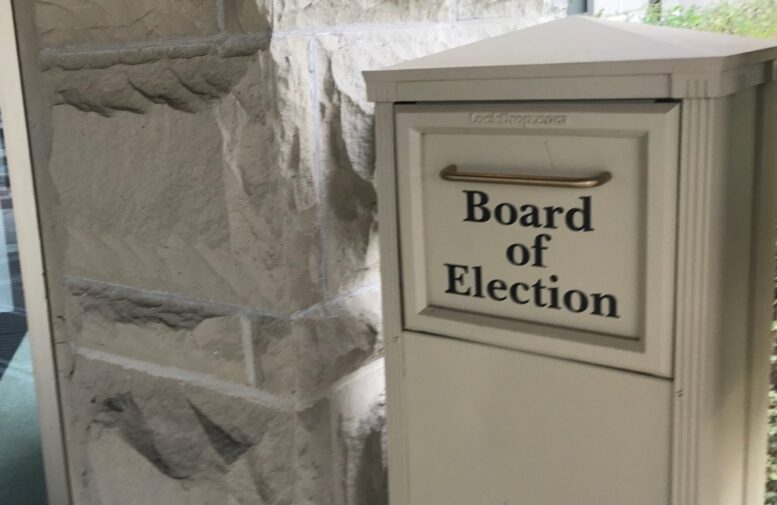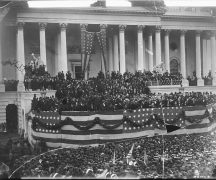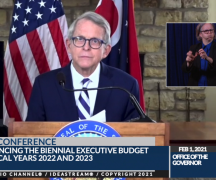A majority of Ohio Controlling Board members are not convinced there is a need to make voting by mail more convenient by prepaying for postage this fall.
They made that determination Monday at a meeting held digitally because of COVID-19 safety protocols — a Zoom conference which began just 45 minutes after news broke that a Controlling Board member had tested positive for the virus.
That member, state Sen. Bob Peterson, R-Washington Court House, joined three other Republicans in voting no: Sen. Bill Coley of Liberty Twp., Rep. Scott Oeslager of North Canton and Rep. Shane Wilkin of Lynchburg.
The vote went 4-2, with two Democrats on the board voting to allow postage: Rep. Jack Cera of Bellaire and Sen. Vernon Sykes of Akron.
Ohioans wanting to vote absentee by mail will be on the hook for securing their own postage. Ballots are being mailed out to voters who request them the first week of October; you can learn more about requesting an absentee ballot here. Voters also have the option of returning their ballot to a dropbox located at their county board of elections office.
Ohio Secretary of State Frank LaRose had sought approval to spend $3 million from his own office to pay for voters’ postage.
Republicans on the board outlined a number of reasons for voting against. Several debated LaRose on whether his office had statutory authority to spend money this way and that it should be up to the state legislature to decide.
Since the conclusion of the primary election, LaRose has requested the legislature approve funding for prepaid postage. Not only has it not done so, but the Ohio House of Representatives passed House Bill 680 that expressly prohibits LaRose’s office from paying the postage. (The bill remains under consideration in the Ohio Senate.)
LaRose actually testified in favor of HB 680, citing support for other components of the bill.
On Monday, Wilkin argued that the legislature had already spoken on the issue by passing HB 680, and said he would be betraying that vote by opting now to approve the postage.
Besides the merits of the decision, Oeslager said it was too late in the election season to make any more changes to how it is conducted.
“I’m highly reluctant to change the rules of any election, let alone a presidential election, at the 11th hour,” he said.
LaRose pushed back, noting that ballots have not yet been sent out to voters and that voting had not even started. He also mentioned bipartisan support from elections officials throughout Ohio for allowing prepaid postage.
LaRose has been vocal about the need for absentee ballots to be returned promptly this fall; prepaying postage would be one way to ensure a quick turnaround for voters who would therefore not be tasked with locating or paying for a stamp.
In a statement following the vote, LaRose called the decision “another missed opportunity by the legislature.”“Ohio has a sound elections system, but today was another missed opportunity by the legislature to make a small change, without an impact on our state budget, that would yield a big improvement,” the statement reads. “Ohio voters have 216 hours to vote early in person from October 6 through November 2, 13 hours to vote on Election Day, or they can request an absentee ballot by mail and it will be sent to them beginning October 6. Make a plan. Don’t procrastinate. Make sure your voice is heard.”
This story is being updated.
***
Also from Ohio Capital Journal:
Alleged Householder texts about nuclear bailout are MIA, House says
Prosecutors say they have a text message sent from then-House Speaker Larry Householder seeking to pressure a fellow lawmaker to vote for a bill at the center of a criminal pay-to-play scheme — a text that an ally allegedly sought to get deleted.
However, the House of Representatives said Friday in response to a records request that the text could not be located from Householder’s phone as it was a “transient document” that did not need to be preserved.
Josh Sabo, deputy legal counsel for the House Speaker’s office, said House policy only requires “transient documents” to be preserved as long as they are of “administrative value.”
Householder, according to an FBI investigation, texted a male House Republican (only identified as “Representative 7”) on May 28, 2019 and pressured him to support House Bill 6, the beating heart of what prosecutors have called the largest bribery scheme in state political history. READ MORE
COVID-19 lawsuit immunity won’t help economy, might increase spread, poll of economists says
Ohio Gov. Mike DeWine on Monday signed a bill providing businesses and other entities broad immunity from lawsuits related to coronavirus infection.
The idea behind the law was to help speed recovery by removing economic uncertainty posed by possible lawsuits filed by employees, customers and others who might become sick if organizations reopened during the pandemic. But a strong majority of Ohio economists surveyed on the matter said the law isn’t likely to help the economic recovery, while it could make the pandemic worse.
“The pandemic IS the cause of the recession,” University of Toledo economist Kevin Egan said in the comment section of the survey, which was released Monday. “Bringing the spread of COVID-19 under control IS the solution for quicker economic recovery. Shielding firms from liability is not efficient; gives them incentives to do too little for worker protection.”
The law, House Bill 606, requires that someone would have to show “reckless, intentional, or willful or wanton misconduct,” to hold businesses, schools or nonprofits liable for “actions or omissions resulting in the exposure to, or transmission or contraction of, COVID-19,” the National Law Review reported. READ MORE
Bush administration ethics lawyer slams hiring of DeJoy as postmaster
WASHINGTON — A top ethics lawyer to President George W. Bush on Monday decried Louis DeJoy’s appointment to postmaster general and called for a congressional investigation into allegations of criminal activity.
Richard Painter, who served as chief White House ethics lawyer and associate counsel to Bush, said DeJoy should not have been allowed to take control of an agency with which he has large financial ties. He also called on the Postal Service to release documents related to DeJoy’s hiring so the committee can conduct “a proper investigation” into the matter.
In 2014, DeJoy’s former company, New Breed Logistics, based in North Carolina, merged with XPO Logistics, a Postal Service contractor.
DeJoy served on the company’s board of directors until 2018 but still holds a major financial stake in the business, according to The New York Times. READ MORE





